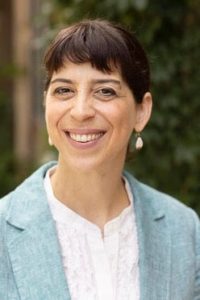The NLS Public Lecture Series | Fear of the False: Forensic Science and the Law of Crime in Colonial South Asia
NAB 201
Thursday, March 27, 2025, 4:00 pm
Open to the public.
 In our upcoming public lecture on March 27, 2025, NLSIU and Max Planck Institute For Legal History and Legal Theory [MPI (LHLT)] will host a public lecture titled ‘Fear of the False: Forensic Science and the Law of Crime in Colonial South Asia’ delivered by Prof. Mitra Sharafi, Evjue-Bascom Professor of Law, University of Wisconsin-Madison. This lecture is being organised as part of the Contours of Legal History in India Conference.
In our upcoming public lecture on March 27, 2025, NLSIU and Max Planck Institute For Legal History and Legal Theory [MPI (LHLT)] will host a public lecture titled ‘Fear of the False: Forensic Science and the Law of Crime in Colonial South Asia’ delivered by Prof. Mitra Sharafi, Evjue-Bascom Professor of Law, University of Wisconsin-Madison. This lecture is being organised as part of the Contours of Legal History in India Conference.
About the Speaker
Prof. Mitra Sharafi is a legal historian whose research focuses on South Asia. She holds law degrees from Cambridge and Oxford (the UK equivalent of a JD and LLM) and history degrees from McGill (BA) and Princeton (PhD). Her first book, Law and Identity in Colonial South Asia: Parsi Legal Culture, 1772-1947 won the Law and Society Association’s 2015 Hurst Prize. She is completing her second book manuscript, provisionally entitled, Fear of the False: Forensic Science and the Law of Crime in Colonial South Asia. Her next major project will explore the world of non-European law students from across the British empire (and globe) who came to London’s Inns of Court to become barristers, 1860s-1960s. Sharafi has published articles on the history of abortion, blood-stain testing, forum-shopping for divorce, the legal profession, constitutionalism and the rule of law, and slavery. Future articles will examine the role of scientific experts in criminal trials, and the history of law books and publishing. Her research has been funded by the American Council of Learned Societies, Institute for Advanced Study, Mellon Foundation, National Endowment for the Humanities, National Science Foundation, Romnes Faculty Fellowship, Shelby Cullom Davis Center, and Social Science Research Council.
Sharafi teaches Contracts I at the UW Law School, along with undergraduate courses in Legal Studies and History. She is the recipient of campus awards for her teaching and mentoring.
Mitra Sharafi is president-elect of the American Society for Legal History. She has hosted the South Asian Legal History Resources website since 2010.
Abstract
During the late nineteenth and early twentieth century, the government of British India created a wave of new institutions for the scientific detection of crime. Falsity was a special preoccupation of colonial officials, who were invested in the “native mendacity” stereotype. Driven by deception anxiety, the new South Asian forensics focused on finding the fake, including the identification of planted animal blood and poison at crime scenes. The new forensics were meant to sidestep the problems of perjury and forgery by relying on scientific testing and experts. But in trying to detect falsity from without namely evidence planted by colonized tricksters, these systems generated new forms of falsity from within, including a rule of criminal procedure that allowed a privileged group of state lab experts not to give testimony in court. This feature, which increases the risk of wrongful convictions, lives on in Indian law today.

